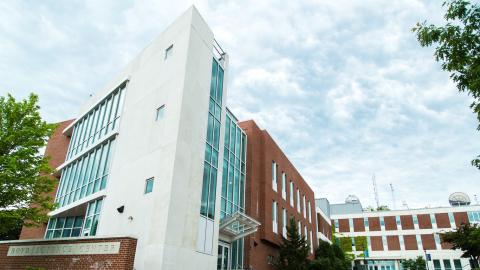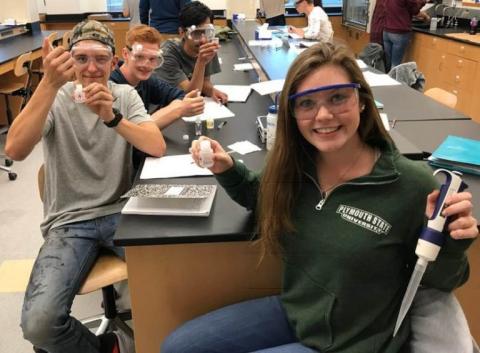The chemistry and biochemistry program is pleased to offer the Bachelor of Science in Chemistry and a Bachelor of Science in Biochemistry. This chemistry program continues the proud tradition at PSU of rigorous academic preparation of students for a variety of career options.
The program includes innovative activity-based learning in small classroom settings. Faculty teach all our lab classes, not graduate students. Chemistry lab sections range from 10 to approximately 20 students in upper level courses. Integration of chemistry majors within the program provides opportunities for students to work closely with faculty and staff as teaching assistants, tutors, and laboratory preparers.
This exciting program is housed in the Boyd Science Center which includes state-of-the-art laboratories and classrooms. A chemistry student center is available for tutoring and student interaction.
Students majoring in the BS in Chemistry select either the General or Environmental Chemistry option. The BS in Chemistry (both options) follows guidelines established by the American Chemical Society. The program includes a required undergraduate research and/or internship experience for both options and prepares students for admission to graduate and professional schools, as well as employment as professional chemists.
Curriculum & Requirements
Degree Requirements
| Course | Title | Credits |
|---|---|---|
| Major Requirements | ||
| CH 2255 | Techniques in Laboratory | 3 |
| CH 2335 | General Chemistry I (QRCO) | 4 |
| CH 2340 | General Chemistry II | 4 |
| CH 3030 | Biochemistry I | 4 |
| CH 3370 | Organic Chemistry I | 4 |
| CH 3380 | Organic Chemistry II | 4 |
| CH 3410 | Physical Chemistry: Thermodynamics and Kinetics (WRCO) | 4 |
| CH 3465 | Physical Chemistry: Quantum Mechanics and Spectroscopy | 4 |
| CH 3500 | Inorganic Chemistry | 4 |
| CH 3550 | Instrumental Analysis (TECO,WRCO) | 4 |
| PH 2510 | University Physics I | 4 |
| PH 2520 | University Physics II | 4 |
| MA 2550 | Calculus I (QRCO) | 4 |
| CH 4100 | Senior Seminar | 3 |
| MA 2560 | Calculus II (QRCO) | 4 |
| Choose one 3-4 credit course from the following list | 3-4 | |
CH 4531 | Senior Research | |
CH 3650 | Environmental Chemistry | |
CH 4600 | Internship | |
| General Education | ||
| EN 1400 | Composition | 4 |
| IS 1115 | Tackling a Wicked Problem | 4 |
| IS 4220 | Signature Project (INCO,INCP) | 4 |
| Electives | 8-23 | |
| CTDI | Creative Thought Direction | 3-4 |
| PPDI | Past and Present Direction | 3-4 |
| SSDI | Self and Society Direction | 3-4 |
| Directions (choose from CTDI, PPDI, SSDI) 1 | 4-8 | |
| DICO | Diversity Connection | 3-4 |
| GACO | Global Awareness Connection | 3-4 |
| WECO | Wellness Connection | 3-4 |
| Total Credits | 120 | |
- 1
Directions should total 16-17 credits because SIDI is waived for BS Chemistry.
Check all course descriptions for prerequisites before planning course schedule. Course sequence is suggested but not required.
To complete the bachelor’s degree in 4 years, you must successfully complete a minimum of 15 credits each semester or have a plan to make up credits over the course of the 4 years. For example, if you take 14 credits one semester, you need to take 16 credits in another semester. Credits completed must count toward your program requirements (major, option, minor, certificate, general education or free electives).
Check all course descriptions for prerequisites before planning course schedule. Course sequence is suggested but not required.
| Year One | Credits | |
|---|---|---|
| EN 1400 | Composition | 4 |
| IS 1115 | Tackling a Wicked Problem | 4 |
| CH 2255 | Techniques in Laboratory | 3 |
| CH 2335 | General Chemistry I (QRCO) | 4 |
| CH 2340 | General Chemistry II | 4 |
| MA 2550 | Calculus I (QRCO) | 4 |
| MA 2560 | Calculus II (QRCO) | 4 |
| CTDI | Creative Thought Direction | 3-4 |
| Credits | 30-31 | |
| Year Two | ||
| CH 3370 | Organic Chemistry I | 4 |
| CH 3380 | Organic Chemistry II | 4 |
| PH 2510 | University Physics I | 4 |
| PH 2520 | University Physics II | 4 |
| PPDI | Past and Present Direction | 3-4 |
| SSDI | Self and Society Direction | 3-4 |
| Directions (choose from CTDI, PPDI, SSDI) 1 | 4-8 | |
| Elective | 0-2 | |
| Credits | 26-34 | |
| Year Three | ||
| CH 3030 | Biochemistry I | 4 |
| DICO | Diversity Connection | 3-4 |
| GACO | Global Awareness Cnnection | 3-4 |
| WECO | Wellness Connection | 3-4 |
| Electives | 1-4 | |
| Credits | 14-20 | |
| Years Three and Four | ||
| CH 3550 | Instrumental Analysis (TECO,WRCO) | 4 |
| CH 3410 | Physical Chemistry: Thermodynamics and Kinetics (WRCO) | 4 |
| CH 3465 | Physical Chemistry: Quantum Mechanics and Spectroscopy | 4 |
| CH 3500 | Inorganic Chemistry | 4 |
| Credits | 16 | |
| Year Four | ||
| IS 4220 | Signature Project (INCO,INCP) | 4 |
| CH 4100 | Senior Seminar | 3 |
| Choose one of the following: | 3-4 | |
CH 4531 or CH 4600 |
Senior Research or Internship |
|
| Electives | 8-24 | |
| Credits | 18-35 | |
| Total Credits | 120 | |
- 1
Directions should total 16-17 credits because DI is waived for BS Chemistry.
- Content Knowledge: Demonstrate mastery of a broad set of chemical knowledge concerning the fundamentals in the core areas of chemistry.
- Problem-Solving Skills: Design, carry out, and record the results of chemical analyses and experiments using classical techniques, modern instruments, and/or computers, then analyze those results to draw reasonable, accurate conclusions.
- Chemical Literature Skills: Employ modern library search tools to locate and retrieve scientific information about a chemical technique, or topic relating to chemistry.
- Laboratory Safety Skills: Observe safe practices in the laboratory, follow proper procedures and regulations for safe use and disposal of chemicals, and respond to emergencies in the laboratory.
- Communication Skills: Communicate chemical concepts and experimental results through effective written and oral communication.
- Team Skills: Work collaboratively with members of a team in classroom and/or laboratory activities.
- Air Quality Engineer
- Biochemist
- College Professor
- Environmental Consultant
- Health Care Administrator
- Instrumentation Specialist
- Microbiologist
- Pharmacologist
- Physicist
- Research Chemist
- Risk Manager
- Technical Writer
- Ability to analyze cause and effects
- Proficiency in analytical reasoning
- Strong mathematical background
- Ability to organize and memorize detailed information
- Strong organization skills
Explore Program Details
The University’s proximity to the lakes, rivers and mountains of New Hampshire gives students access to a unique natural laboratory. Small class sizes mean a favorable student to faculty ratio, with faculty focused on undergraduate education. Resources in the department include dedicated space for undergraduate research and multimedia technology resources.
Instrumentation

- Oxford Instruments Cryogen-Free Benchtop NMR Analyser-Pulsar
- Shimadzu MALDI-TOF
- Dionex HPLC with autosampler and multi-angle light scattering laser
- Varian Flame AA
- PerkinElmer FT-IR with ATR
- Agilent GC-MS
- Thermal cyclers
- Polarography
- Shimadzu UV/VIS
- Fluorometer
- 2D electrophoresis
- Low-pressure chromatography system
- Digital imaging and analysis software
- Speed-vac
- Centrifuge
- -80 freezer
- Sonicator

The heart of scientific research and study at PSU is the Boyd Science Center. The University’s proximity to the lakes, rivers and mountains of New Hampshire gives students access to a unique natural laboratory. Resources at Boyd provide students with a place to explore nature’s questions, generated in the great outdoors or under the microscope.
Resources at Boyd
- Climate-controlled chambers for whole organism research
- Dedicated spaces for student research
- PCR, Rt-PCR, Western blotting, Immunohistochemistry
- Animal behavior lab with advanced video tracking
- BSL-2 Microbiology lab
- Six 300-liter marine aquariums
- Human physiology lab
- Collection of bird specimens
- Dedicated tissue culture facility
- Rooftop greenhouse with computerized temperature controls and separate areas for preparation and growing
- PSH, an herbarium of 20K preserved and mounted specimens


Explore Today.
Realize Tomorrow.








